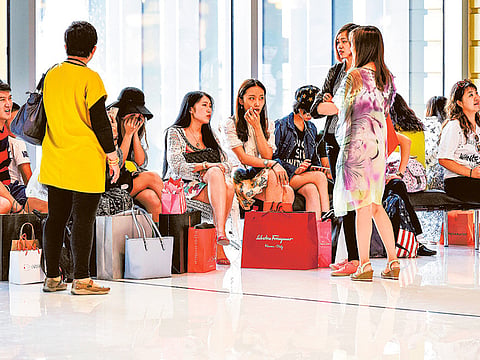High-spending Chinese visitors stroll back into Dubai
Dubai attracted 520,000 guests from China in 2016, a 22% rise over previous year

DUBAI: Yang Zhou moved to Dubai from Beihai, a coastal city in China, nearly three years ago to work as a tour guide.
“A friend had moved to Dubai a year earlier and I had heard so much about the quality of life and wanted to check it out for myself,” he says. “I was told there was a demand for Mandarin speaking staff because many Chinese visitors cannot speak English.”
He currently works as an independent tour operator — liaising with hotels and travel agencies on sightseeing tours around the UAE for small to medium sized tour groups.
This week he is to take 14 Chinese visitors — 7 from Jianxi, a province in southeastern China and 4 from Shaanxi, a province in its northwestern region — around Dubai and Abu Dhabi.
Zhou plans to start the trip by taking them for a desert safari, then visiting the gold and spice souqs on the second day, a trip to Abu Dhabi on the third, and the last two days mainly at a variety of shopping malls in Dubai.
“Shopping is definitely more expensive here but there is more variety at the stores than back home and they certainly want to take back gifts for their family and friends,” Zhou translates one of the visitors, Cong-Gao Hu, a retired health care worker who is visiting Dubai with his wife for the second time, explaining why they are both most looking forward to visiting Dubai Mall again.
Dubai attracted 520,000 guests from China in 2016, a 22 per cent increase over the previous year, according to statistics shared by Sultan Siddiqi, a travel agent at Orient Travels in Dubai.
The tourists his agency handles spend around Dh8,000 per trip per person on an average and are drawn mainly from the middle to upper-middle class, between the ages of 25 to 55.
Cong-Gao Hu, his wife, and the 12 other guests currently under Zhou’s wings are among this increasingly growing Chinese middle class who, according to the UN World Tourism Organization, are “globetrotters and also the world’s biggest spenders when on holiday”.
According to data from the Chinese National Tourism Agency, the Chinese outbound tourism growth rate is forecast to see slow but steady growth year on year till 2020.
The data also adds that more than 146 different countries have signed tourism agreements with the Chinese government, and over 127 countries are actively engaged in tourism promotion.
China relaxed travel restrictions for group tours to the UAE in 2009 — and Dubai has been taking strives to attract a larger proportion of outbound Chinese tourists year on year.
“Chinese tourists are now the 7th largest source market in the emirate,” says Peter Goddard, managing partner at Tri Consulting, a managing consultancy specialising in hotels, leisure, and real estate. “Good flight connections, competitive hotel room rates, security, and now, the visa on arrival are all driving the growth of Chinese tourists to Dubai.”
The Chinese welcome
Hotel chains are also streamlining through a variety of hospitality programmes and initiatives to attract the high-spending Chinese tourists.
“There are various programmes that companies in the tourism industry can join to show that they cater to Chinese visitors including a variety of independent initiatives operated by international hotel chains,” says Goddard.
In 2014, InterContinental Hotels Group introduced a ‘China Ready’ programme — a certification it gives to its hotels that fulfil a criteria to include Mandarin-speaking staff, acceptance of Chinese bank cards and Chinese tea for guests.
As of 2016, six of its Dubai hotels have the status, according to TRI.
Select Holding, a Shanghai-based consultancy and tour operator, under the Chinese tourism ministry’s purview, also introduced a similar certification — the Welcome Chinese programme.
Select Holding would promote hotels and attractions in the Chinese market. In return, hotels employ Mandarin-speaking concierges, show Chinese television channels and accept Chinese bank card payment services.
“The potential of the middle class travellers is astounding and initiatives like these simply benefit both parties and create more awareness about Dubai as a tourism destination in the Chinese market,” says Siddiqi.”
The Dubai Tourism and Commerce Marketing also signed a partnership with Tuniu, an online Chinese travel agency, last year to launch collaborative marketing initiatives. “The scale and potential of that market is just so immense and we are only beginning to tap in,” Siddiqi said. “2017 will see a higher rate of growth. We are hopeful.”
Rabiya Shabeeh is a freelance journalist based in Dubai.


